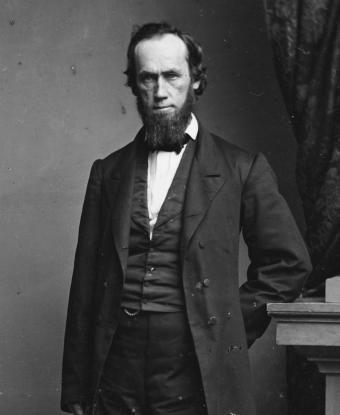Encyclopedia Dubuque
"Encyclopedia Dubuque is the online authority for all things Dubuque, written by the people who know the city best.”
Marshall Cohen—researcher and producer, CNN
Affiliated with the Local History Network of the State Historical Society of Iowa, and the Iowa Museum Association.
VANDEVER, William
VANDEVER, William. (Baltimore, MD, Mar. 31, 1817--Ventura, CA, July 23, 1893). Vandever, admitted to the Iowa bar in 1852, began his legal practice in Dubuque. In 1855 Protection Fire Company #2, the only fire company under the control of the city, nominated him as Chief Engineer of the Fire Department and asked the city council to confirm the nomination. (1)
He entered the newspaper business by purchasing the press and other fixtures of the IOWA TRANSCRIPT from Henry Wharton and a Mr. Hill who had previously purchased the share of Orlando MCCRANEY. Vandever moved the paper to Rock Island. (2)
He was elected as a Republican to the 36th and 37th Congresses. His victory was probably considered a surprise. Dubuque was a solidly Democratic stronghold, but the election came at a time when the state was moving Republican. While not an abolitionist, he was firmly against Stephen Douglas' "popular sovereignty" which would allow the spread of slavery. He served as a member of a peace convention in Washington, D.C., which attempted to find a way in 1861 of avoiding the CIVIL WAR. (3)
When Lincoln's call for troops went out, the TELEGRAPH went no further than Davenport where Vandever happened to be staying. He carried the telegram to Governor Kirkwood's home in Iowa City to apply. However only after attending a special session of Congress, did he join in 1861. Vandever became a colonel of the 9th Regiment, Iowa Volunteer Infantry, without resigning his seat in Congress or having any military experience. (4)
They were ordered to Benton Barracks, Missouri, but were soon sent into the interior of Missouri to protect the Pacific Railroad. The 9th was made a part of the Army of the Northwest in January, 1862 with General Vandever in command of the brigade and Lieutenant Colonel Francis J. HERRON commanding the regiment. At the battle of Pea Ridge, two hundred thirty-seven soldiers were killed or wounded from a total of five hundred and fifty. For their distinguished bravery, the brigade was awarded a stand of colors by the ladies of Boston. Vandever was promoted to brigadier general. Vandever rose to the rank of Brevet Major-General for gallantry at Bentonville. (5)
After the war, Vandever returned to his legal practice in Dubuque and served as the president of Hyde Post of the GRAND ARMY OF THE REPUBLIC (G. A. R.) being elected on May 20, 1882 and re-elected on December 4, 1882. (6) During his second term in the House, Vandever sponsored legislation to create both Sequoia and Yosemite National Parks. (5) He was appointed U.S. Indian inspector by President Grant in 1873.
(n 1877 Vandever expressed the following philosophy opposing the federal government's dealing with the various tribes of Native Americans:
If our government is based on Christian principles, it should
display more conscience than force in dealing with the Indians.
It is a shame, for a great nation, to disregard the principles
of equity, in dealing with a perishing race of barbarians, whom
it disposed of long cherished homes. To doom to extermination a
people, that dared defend their land from invasion, would be a
crime. (7)
Vandever moved from Dubuque to California where he was re-elected to Congress and again served two terms. (8)
There is an 11,947 foot high mountain named for him in the Sierra Nevada, but in 1896 his name was among those removed from consideration for inclusion on the Iowa Soldiers' and Sailors' Monument in Des Moines. (9) This may have been a continued "price" to pay for his activities in the Civil War. Vandever's refusal to resign his seat in Congress brought a case against him based on the United States Constitution which prohibited members of Congress from holding any other federal office at the same time. (10) Among the troops, he was considered a "political officer" because he had not worked his way up the ranks.
---
Source:
1. "Proceedings of the City Council," Express & Herald, December 19, 1855, p. 3
2. "Dubuque County Before 1880," Telegraph-Herald and Times-Journal, September 21, 1933, p. 17
3. Anderson, Douglas Firth, "William Vandever: Presbyterian, Congressman, General," in Dutch Americans and War: United States and Abroad, eds. Robert P. Swierenga, Nella Kennedy, and Lisa Zylstra (Holland, MI: Van Raalte Press, 2014): 55
4. Ibid. p. 56
5. Ibid.
6. "The Ninth Iowa Infantry," Dubuque Herald, June 24, 1865, p. 2
7. "G.A.R. Roster," Dubuque Sunday Herald, February 23, 1890, p. 5
8. "William Vandever," U. S. National Park Service, Online: https://www.nps.gov/people/william-vandever.htm
9. "That Monument," Dubuque Herald, April 22, 1896, p. 4
10. Anderson, p. 54


